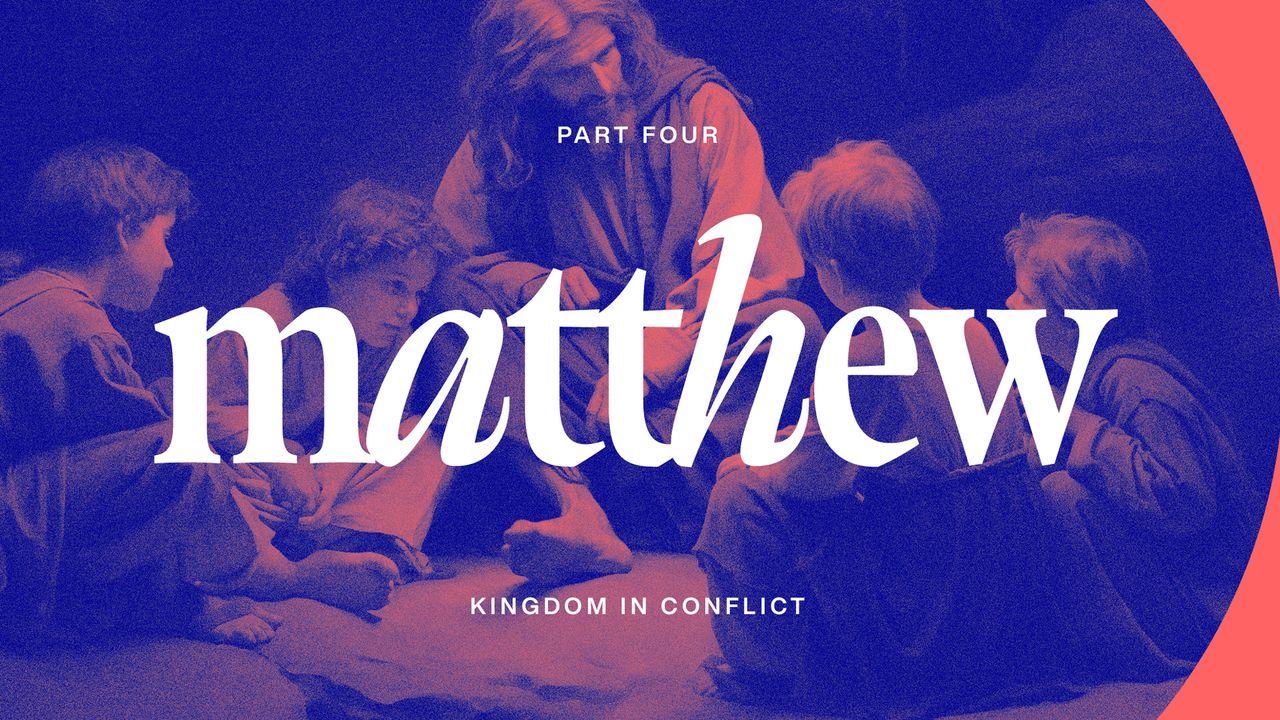Matthew 13-20: Kingdoms in Conflictਨਮੂਨਾ

Faulty Faith
By Pastor Dan Hickling
“And when they had come to the multitude, a man came to Him, kneeling down to Him and saying, ‘Lord, have mercy on my son . . . for he often falls into the fire and often into the water. So I brought him to Your disciples, but they could not cure him.’”—Matthew 17:14–16 (NKJV)
Peter, James, and John had been led up to a mountaintop experience by Jesus where they saw Him revealed in all of His heavenly glory. No earthly experience would compare to the amazement in that moment. But as with all experiences on earth, it came to an end. As they make their way back to the mountain’s base where their fellow disciples remained, their hit with the reminder that life isn’t all mountaintop experiences.
Suddenly, a man makes his way toward them. He falls to his knees before Jesus, indicating how helpless and desperate he is. He cries out to Jesus for mercy on behalf of his son, who is apparently afflicted with a demon who drives his son to harm himself. It’s a life and death dilemma this dad is dealing with, made all the more critical by the other disciples who were left behind (the next best thing to Jesus on earth) and totally unable to help! Watch how Jesus responds:
“Then Jesus answered and said,‘Ofaithless andperverse generation, how long shall I be with you? How long shall I bear with you? Bring him here to Me.’And Jesusrebuked the demon, and it came out of him; and the child was cured from that very hour.”—Matthew 17:17–18 (NKJV)
The son is delivered in a miraculous manner by Jesus, which is what we might expect. But what isn’t so expected is the statement Jesus made prior to the healing. He accuses those present of being faithless and perverse—He even questions how long He should bear with them. That’s worth our attention, because it indicates something was really lacking in terms of faith—and it’s indicated the disciples who had tried to help were included in this rebuke.
Perhaps they were expecting to hear Jesus say something like, “Hey, that’s okay. I appreciate you trying to help out, but I’ll take care of this one.” Instead, they heard just the opposite. They heard something really important was missing and so, to their credit, they ask Jesus a follow-up question about it:
“Then the disciples came to Jesus privately and said, ‘Why could we not cast it out?’ So Jesus said to them,‘Because of yourunbelief; for assuredly, I say to you,if you have faith as a mustard seed, you will say to this mountain, “Move from here to there,” and it will move; and nothing will be impossible for you.However, this kind does not go out except by prayer and fasting.’”—Matthew 17:19–21 (NKJV)
Three words stand out to us in Christ’s answer: faith, prayer, and fasting. It’s clear that Jesus has an elevated view of faith; that He sees it as something the rest of them didn’t. It was more capable and powerful than they could imagine, and their inability to heal was connected to their lack of faith. But that’s not where Jesus leaves things. He also draws in the dynamics of prayer and fasting into the picture.
Yes, faith is essential to operating in the supernatural, but praying and fasting is essential to faith! Why is that? What’s so necessary about prayer and fasting? Well, prayer and fasting connect us to the One who is the object of faith to begin with. Faith was lacking because connection with God (through prayer and fasting) was lacking. In other words, the disciples were trying to do a spiritual work that seemed right, but they were missing the connective relationship by which that work could only be done. Jesus is saying that faith, effective faith, isn’t formulaic, it’s relational. It’s only as strong as the relationship one has with the Father.
Does our faith falter because we don’t pray or fast enough? Remember, it’s not in the outward activity of prayer and fasting that gives our faith power, it’s in the relational reality that prayer and fasting serves to facilitate. They bring us closer to the Father, and the closer we are to the Father, the stronger our faith in Him will be. If you focus on faith, itself, it will always be faulty. But if you focus on the Father, your faith will be as it should be.
Pause: What did the disciples lack in this instance?
Practice: Examine the relationship between faith, prayer, and fasting and why it’s important for us to understand it.
Pray: Father, we confess we tend to make our faith in You formulaic, when in reality what we need in order to have strong faith is a strong relationship with You. May we pursue You more deeply through the things that connect us to You, like prayer and fasting. Help us to focus on You, and to know that when we are close to You our faith will be as strong as it should be. Amen.
ਪਵਿੱਤਰ ਸ਼ਾਸਤਰ
About this Plan

In part four of this verse-by-verse breakdown of the Gospel of Matthew, we'll work our way through Matthew 13-20.
More
Related Plans

Walk With God: 3 Days of Pilgrimage

Deeper in Worship

Moses: A Journey of Faith and Freedom

Faith-Driven Impact Investor: What the Bible Says

Spirit-Led Emotions: Mastering Emotions With Holy Spirit

YES!!!

Psalms of Lament

I'm Just a Guy: Who Feels Alone

Prayer Altars: Embracing the Priestly Call to Prayer
